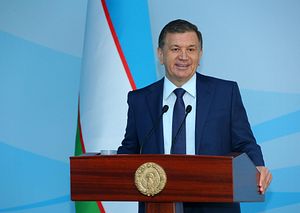The Uzbek government and New York’s Citigroup have laid out a plan to sell $300 million in sovereign bonds this year to test the international trust in the country’s reformist path. This would be Uzbekistan’s first bond issue and could become part of a regional trend, since Tajikistan also issued its first bonds last year to finance the construction of a dam and hydroelectric power plant.
The Uzbek bond could be issued in either U.S. dollars or euros, according to Finance Minister Djamshid Kuchkarov, who visited partners and ratings agencies in New York last week to gauge the feasibility of the government’s plan. Ultimately, the sale will be worth between $200 million and $300 million.
After the death of the country’s first president, Islam Karimov, in 2016, the new head of state, Shavkat Mirziyoyev, laid out a long-term reform plan. Most of Mirziyoyev’s actions in his first year-and-a-half in power have been geared toward the outside world in an effort to signal Uzbekistan’s readiness to come out of the era of isolation that had characterized Karimov’s presidency.
Currency liberalization was the first concrete, although imperfect, example of the new policy. Since removing the currency peg to the U.S. dollar in September 2017, the Uzbek sum has lost only 1.5 percent of its value.
In Central Asia, Uzbekistan and Tajikistan’s strategies denoted a widespread interest for international recognition of their respective countries as trustworthy markets for investors. Uzbekistan, with its larger population and more developed economy, could be an easier bet for investors than Tajikistan was last year.
Investors have shown a peculiar appetite for high-yield bonds, especially from the former Soviet Union. In 2017, Austrian lender Raiffeisen Bank International helped manage both the Tajik $500 million sale and the Belarusian $1.4 million issue. The long caveats in each bond prospectus from former Soviet countries have failed to scare investors, who have consistently oversubscribed the sales.
Demand is clearly higher than the offer, but there is also a question of fickle yields and risk of nonpayment. The economic crisis that hit Central Asia over the past three years, for example, caused instability in the yields of Tajikistan’s bond and, should the Rogun dam project be delayed or fail, the government could decide to default on its international debt. Bloomberg calculated that investors who bought Tajik bonds in September 2017 have already lost 2.8 percent in the first six months.
For now, Tajikistan said construction works have progressed and the consortium building the dam, formed of a local government company and Italy’s Salini Impregilo, has received a $65 million payment directly funded through the Eurobond. The government said the project will be inaugurated in November this year.
Kazakhstan, which has more experience in the sovereign bond market, seems to be looking for other ways to raise cash, namely privatization. The government said it wants to put up for sale stakes of its flagship companies. Kazakhtelecom, oil and gas producer Kazmunaigas, Air Astana and uranium miner Kazatomprom should offer shares in international markets through IPOs this year, according to the plan.
Through privatization, Kazakhstan aims to restructure some of the country’s most expensive enterprises and largest employers. Sustained low commodity prices have weighed heavily on companies, such as Kazmunaigas, that rely on oil exports. Furthermore, KMG EP, a London-traded branch of Kazmunaigas, is on the brink of delisting its global depository receipts due to a long-lasting spat with its independent directors.
Should the plan underperform or fail, Kazakhstan will have to cope with financial trouble given the ongoing court litigations that have led to the freezing of $22 billion of the country’s National Fund. While the court cases have hit yields for Kazakhstan’s outstanding bonds, thus making them less expensive to pay back, a protracted asset freeze would hinder the government’s ability to use the pot of cash it had saved up for the rainy days of low oil prices.
The Uzbek government said it will also plan a privatization drive in the near future.
“We want Uzbek companies to also be in the international financial market. Our aim is to turn Uzbek companies into modern corporations,” Kuchkarov said in an interview.
But before putting up state-owned company shares for sale, however, the Uzbek government needs to see if global investors are ready to bet on the sustainability of the country’s new course. A positive outcome from the bond sale would put Uzbekistan back on the map of financial markets.

































